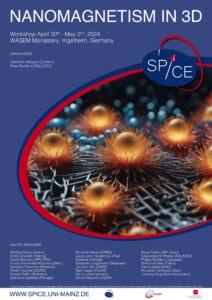Workshop, July 8th - 10th 2025
Van der Waals materials are a fruitful playground for developing new emergent physical phenomena from bulk down to the two-dimensional limit. Regarding spins, magnetism arises in these systems either naturally —i.e., in van der Waals magnets— or by design —that is, engineering proximity or twist effects in van der Waals heterostructures, even if the starting layers are not magnetic per se!—. Some fundamental properties underlying these magnetic layers are the spin-switching and spin-transport mechanisms, the magneto-elastic coupling or the emergence of topological spin textures (e.g., skyrmions) and topological effects (e.g., the anomalous spin Hall effect), just to mention a few. Understanding these basic properties is key to its integration into devices, impacting in areas like spintronics, magnonics, or opto-electronics.
A characteristic fingerprint of this field is multi-disciplinarity since several disciplines are strongly involved, including chemical growth, advanced physical characterization techniques at the nanoscale (magnetic imaging, magneto-transport measurements, optical characterization, mechanical testing, …), and theoretical modeling, among others. This workshop gathers young researchers working in these areas, offering a holistic vision of the field of magnetism in van der Waals materials, discussing its current challenges, and envisioning future directions.
Overall, we aim to realize new synergetic effects not only between van der Waals layers but, even more importantly, between young researchers, thus creating a forum for future collaborations and scientific exchange.
This workshop is organized by SPICE as part of the Gutenberg International Conference Center (GICC) at Johannes Gutenberg University Mainz (JGU). The GICC is funded through the German Research Foundation’s (DFG) university allowance in the Excellence Strategy program and aims at fostering JGU as a national and international research hub. By organizing regular conferences and workshops in fields of excellent JGU research, the GICC provides a platform to build interest networks and collaborations – to promote exchange and dialog among academics and research groups from all over the world.






